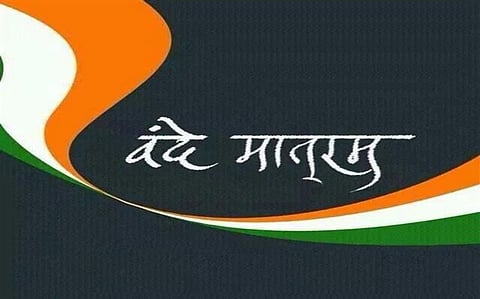
- HOME
- OPINION
- ON GROUND
- INTERVIEW
- INDIA
- NewsGram USA
- WORLD
- न्यूजग्राम
- POLITICS
- ENTERTAINMENT
- CULTURE
- LIFESTYLE
- ECONOMY
- SPORTS
- Jobs / Internships
- Misc.
- NewsGram Exclusive

August 19, 2017: It was in 1876 that Bankim Chandra Chattopadhyay wrote Sanskrit and Bengali mixed verses of Vande Mataram, the national song of India. However, it was originally written in Bengali as 'Bande Matara' a few years before it published.
The most famous rendition of the National Song was carried out at an Indian National Congress meeting by Rabindranath Tagore in 1896.
Vande Mataram as a phrase was also of common usage among the freedom fighters during the struggle for independence from the British rule.
The song has been used in the pop culture and Bollywood in a variety of ways. In 1952, Lata Mangeshkar covered the song on Hemant Kumar's tune for the movie Anand Math. Later in 1998, Lata Mangeshkar did her over version which had added stanzas of Hindi but the tune remained the same.
Manna Dey's version came out in 1951 and AR Rehman's version of the song came out in 1997 as Maa Tujhe Salaam. The most recent, in 2012, Sonu Nigam along with Sunidhi Chauhan did a version featuring famous percussionist Bickram Ghosh.
In poetry as well, different ragas have been used to express the national song.
The father of the nation, Mahatma Gandhi, favored Pandit VD Paluskar's composition. Paluskar himself was known for singing the song in Congress meetings. Interestingly enough, he was once intercepted by Maulana Ahmed Ali's objection at the Kakinada Convention in 1933.
The Congress decided to use the song's first two stanzas while excluding the other half which is about Hindu goddesses. These two stanzas were sung at the All India Radio on 15th August 1947 by Pandit Omkarnath Thakur.
Tagore's version in 1896 was a slower one. A gramophone record of 1904 which is now available online was released with Tagore's voice.
Shri Aurobindo had translated Vande Mataram to English in 1909.
Vande Mataram, in its over 140 years of history, has come under a lot of allegations. Starting with the origination, Vande Mataram faces challenges as it comes from Chattopadhyay's novel Anandamath in which the enemy was identified as the Muslim ruling class. Additionally, the invocation of Hindu goddesses in later stanzas was questioned as well.
However, the song still managed to become India's national song with Jana Gana Mana being the national anthem.
The Indian National Army (INA) had composed a Hindi version of Jana Gana Mana to replace their anthem for Provisional Government for Free India in Singapore, which was Vande Mataram.
Objections to Vande Mataram were first aired publicly in 1933. At the time, Vande Mataram was sung along Saare Jahan Se Acha by poet Allama Iqbal. Iqbal had written this song in 1904 and had initially titled it as Tarana-e-Hind. But within two years, drastic changes took place. Iqbal became an advocate for the two nation theory and demanded a separate Pakistan. He also changed the title of the song to Tarana-e-Milli.
– Prepared by Saksham Narula of NewsGram. Twitter: @Saksham2394
